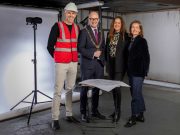 Ronan Traynor discusses how the environmental crisis is making us do better.
Ronan Traynor discusses how the environmental crisis is making us do better.
It was far more work than we anticipated. In fact it was pretty gruelling – and expensive. People in the office grumbled at the additional form filling and the change to their routine ways of working. Regular audits have sent us scrambling as we try to squeeze them around ‘real work’ schedules. Frankly, achieving and maintaining ISO 20121 Sustainability Certification for the past five years has been a royal pain in the ass.
So why did we do it? And was it worth it?
The London Olympics were the catalyst for ISO 20121 Sustainability Management System. It was developed to ensure that agencies working on every aspect of the Games were part of a positive environmental, economic and social legacy – with minimal material waste, energy consumption or strain on local communicates. Fast forward to 2019 and it’s been adopted as a standard of best practice by bodies like UEFA. So as well as giving our environmental consciences a nice pat on the back, we felt it was a requirement if we wanted to compete on international pitches.
With some notable exceptions, Irish business has been late to the good environmental practice party and we remain one of the only agencies with sustainabilty certification. We haven’t won any new business directly on the back of it – but without doubt it’s helped us produce more environmentally responsible projects for clients. And its also helped us to become a better organisation. The benefit of the management system like ISO is that it gives agencies a structured approach to addressing sustainability aspects. It allows you to develop a more effective programme than if you just ab-lidded it.
Secondly, a management system approach will give you more credibility with stakeholders and regulators – and for any large project these days, it is essential to get this element right.
The good news for your CFO is that sustainability can achieve significant cost savings through resource efficiency – but it is hard to realize these without having a proper management system. Like a functioning sanitation system, ISO 20121 system is an unsexy – but essential – bedrock that responsible environmental practice can be built upon.
You’d have to have lived under a rock not to have felt the sudden second wind that environmental activism has experienced in the past 12 months. From Glastonbury going plastic free to Greta Thunberg and the Extinction rebellion protests happening across the planet. It’s clear that Irish consumers are on board for change too. A 2018 Nielsen report found that 91% of respondents felt retailers should do more to reduce the amount of plastic packaging. 48% were actively seeking out products with minimal packaging and are looking for manufacturers to provide this choice.
More and more of the global brands we work with, are coming to us asking how they can demonstrate their commitment to reducing their environmental footprint. They understand the public can be cynical – greenwash is an easy accusation to throw on Twitter – so they’re looking for authentic and creative ways of showing consumers that they’re meeting their words with real action. Like us all, their challenge is to accelerate change fast enough within their organisations to meet both consumer concerns and the global crisis.
So how do we avoid an exercise in green washing and create real change in our agencies and for the brands we work for?
There are four simple areas any business can improve their sustainability credentials today:
- Sustainability doesn’t have to Be Boring
Let your creative partners off the leash. Take risks. Find a truth around sustainability that’s credible for your brand and stay authentic.
- Awareness meets Action
Identify sustainability champions within your business and empower them to action change as part of an overall strategic plan. Set real targets. Start small. Make sure it’s a diverse cross section of your agency.
- Design for Perpetuity
We all design and market products which contribute to the mountains of waste. Bruce Mau, the Canadian designer calls design for perpetuity, “The highest concept of sustainable design. It’s the idea that we can design systems and processes that can run forever with little to no waste or byproducts”.
- Supply Chain
How can we support and incentivise suppliers to be more sustainable? Let your environmental preferences be known!
To Conclude
Five years ago, we were all still happily sucking on single use plastic straws – and becoming a bit more sustainable was a ‘nice to have’. Today in the era of the extinction rebellion, brands taking action on climate change feels more like a mandatory.
Ronan Traynor is founder at Verve.
First published in Irish Marketing Journal (IMJ July 2019)© to order back issues please call 016611660




















